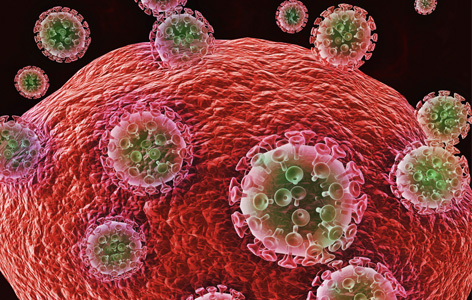Home page Description:
Researchers discover proteins in crocodile blood that can stop HIV infection.
Posted On: July 22, 2016

Image Caption:
HIV viruses infect CD4 T cells (pictured)—a type of immune cell—and disrupt their ability to help fight infections.
Human immunodeficiency virus (HIV) is responsible for the development of acquired immunodeficiency syndrome, also known as AIDS. Infection with HIV, a type of retrovirus, occurs when the virus inserts itself into human DNA and uses the cell’s own machinery to replicate.
Interestingly, there are no reports of retrovirus infections in saltwater crocodiles. This suggests that crocodiles could have protective factors against these viruses. Identifying these factors could provide new insights to how retroviruses like HIV infect humans.
Dr. Donald Branch (TGHRI Affiliate Scientist and PM CCRU Researcher) and Stephen McCarthy (University of Toronto) initiated a study to find these factors. Their research team infected human cells with HIV in the presence of crocodile blood, and found that the blood suppressed HIV infection. By separating the blood into different components, the researchers identified the exact proteins responsible for this effect; these proteins were analogous to human proteins called histones, which regulate gene expression. While the histones did not prevent HIV from inserting itself into host DNA, they did prevent viral protein expression, a key step in the HIV lifecycle.
Despite the fact that human cells have histone proteins, they are still susceptible to HIV infection. To help reconcile this fact, the team looked for histones in the blood of those with HIV. They found that people with HIV produced less histones than those without HIV.
“The results of our study suggest that HIV may evade the body’s natural defence mechanisms in part by suppressing the production of these protective proteins,” says Dr. Branch. “Restoring histones in the blood—by boosting their production or by creating a drug with similar functions—may be a new treatment strategy for HIV.”
This work was supported by the Canadian Foundation for AIDS Research, the Ontario HIV Treatment Network, the Canadian Institutes of Health Research, the Canadian Blood Services Centre for Innovation, Health Canada and the Toronto General & Western Hospital Foundation.
Extracellular histones identified in crocodile blood inhibit in vitro HIV-1 infection. Kozlowski HN, Lai ET, Havugimana PC, White C, Emili A, Sakac D, Binnington B, Neschadim A, McCarthy SD, Branch DR. AIDS. DOI 10.1097/QAD.0000000000001159. 2016 May 17. [Pubmed abstract]
Interestingly, there are no reports of retrovirus infections in saltwater crocodiles. This suggests that crocodiles could have protective factors against these viruses. Identifying these factors could provide new insights to how retroviruses like HIV infect humans.
Dr. Donald Branch (TGHRI Affiliate Scientist and PM CCRU Researcher) and Stephen McCarthy (University of Toronto) initiated a study to find these factors. Their research team infected human cells with HIV in the presence of crocodile blood, and found that the blood suppressed HIV infection. By separating the blood into different components, the researchers identified the exact proteins responsible for this effect; these proteins were analogous to human proteins called histones, which regulate gene expression. While the histones did not prevent HIV from inserting itself into host DNA, they did prevent viral protein expression, a key step in the HIV lifecycle.
Despite the fact that human cells have histone proteins, they are still susceptible to HIV infection. To help reconcile this fact, the team looked for histones in the blood of those with HIV. They found that people with HIV produced less histones than those without HIV.
“The results of our study suggest that HIV may evade the body’s natural defence mechanisms in part by suppressing the production of these protective proteins,” says Dr. Branch. “Restoring histones in the blood—by boosting their production or by creating a drug with similar functions—may be a new treatment strategy for HIV.”
This work was supported by the Canadian Foundation for AIDS Research, the Ontario HIV Treatment Network, the Canadian Institutes of Health Research, the Canadian Blood Services Centre for Innovation, Health Canada and the Toronto General & Western Hospital Foundation.
Extracellular histones identified in crocodile blood inhibit in vitro HIV-1 infection. Kozlowski HN, Lai ET, Havugimana PC, White C, Emili A, Sakac D, Binnington B, Neschadim A, McCarthy SD, Branch DR. AIDS. DOI 10.1097/QAD.0000000000001159. 2016 May 17. [Pubmed abstract]




